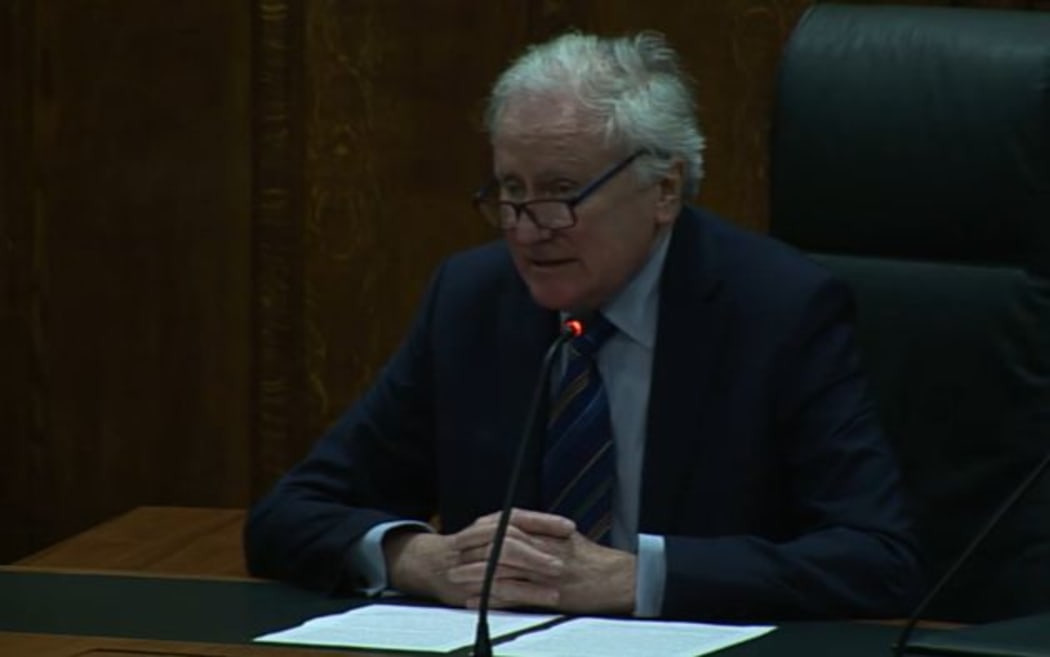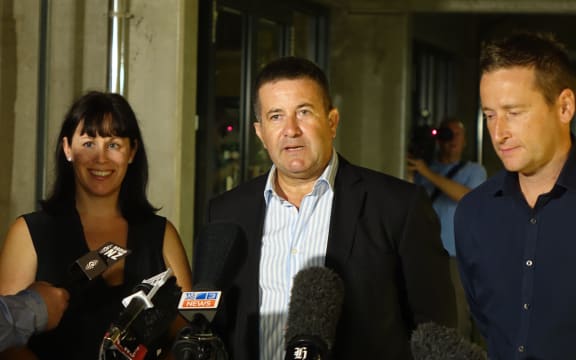The brother of Susan Burdett has called the Privy Council's decision to quash the convictions of Teina Pora the only reasonable outcome.

A screenshot from the livestream of the Privy Council's decision, showing Lord Kerr. Photo: SUPPLIED
The decision was delivered by Lord Kerr at the Privy Council in London shortly after 10pm.

Ingrid Squire, Jonathan Krebs and Tim McKinnel gather at the Auckland press conference. Photo: RNZ / Carla Penman
Teina Pora has twice been convicted for the 1992 rape and murder of Susan Burdett in South Auckland.
But tonight's decision means those convictions no longer stand.
Jim Burdett said he was "unsurprised" by the findings.
Asked if he would be willing to meet with Mr Pora, he said that was up to Mr Pora.
"That's a possibility... He's the one who's been through the mill on this."
Mr Pora's lawyer Jonathan Krebs said his thoughts were with the family of Susan Burdett whose body was found bludgeoned to death in her South Auckland unit.
"Twenty-three years ago, nearly, she was murdered. Every time the matter of Teina's appeal comes to the press, they must relive that."
He said his client was with friends and family when he was told of the Privy Council's decision.
"We were able to tell him a short time before the decision was handed down ... He was initially speechless but as it sank in, he was probably the happiest man in the country tonight."
The Privy Council have also taken the unusual step of calling for submissions on whether there should be a third trial for Mr Pora, who has spent 22 years in prison for the crimes he's always said he did not commit.
Decision affected by recent diagnosis
In the formal decision, the Privy Council noted that much was made at both Mr Pora's trials of his confessions to police.
But the Privy Council received expert evidence from two medical experts, Dr McGinn and Dr Immelman.
They both gave evidence that concluded there was the risk of a miscarriage of justice and explained why Mr Pora's confessions may have been false.
"This is of central and critical importance to one's approach to the question whether his convictions can be regarded as safe.
"The impact that evidence of a confession will have, especially a confession to heinous crime, is difficult to overstate. The natural reaction to such an admission is that it is bound to be true. Why would someone confess to a dreadful crime if they were not guilty of it? But experience has shown that false confessions, even to the most serious of offences, are often made."
The Privy Council concluded: "the combination of Pora's frequently contradictory and often implausible confessions and the recent diagnosis of his FASD [fetal alcohol spectrum disorder] leads to only one possible conclusion and that is that reliance on his confessions gives rise to a risk of a miscarriage of justice.
"On that account, his convictions must be quashed."

Teina Pora Photo: TVNZ / One News
The Crown
Crown Law and the Solicitor General will review the Privy Council decision and talk to police and the family of the victim in the case.
A spokesperson said the office would be making submissions on whether there should be a retrial but had not made a decision.
The police said they would take their time to fully consider the judgment and expected to hear from Crown Law about any submissions the crown planned to make.
Assistant Commissioner Malcolm Burgess said the Privy Council reinforced that no police officers exerted pressure on Mr Pora to confess.
Attack linked to Malcolm Rewa
Ms Burdett was found bludgeoned to death in her South Auckland home.
DNA found at the scene linked the attack to serial sex offender Malcolm Rewa.
Rewa was found guilty of raping Ms Burdett, but two High Court juries could not decide if he also murdered her.
The Privy Council was tasked with ruling on whether the Court of Appeal was wrong to restrict evidence about Rewa. It also considered whether the court should consider fresh evidence about Malcolm Rewa's erectile dysfunction.
Mr Pora's lawyers had argued that Rewa would never have taken a young man with him because he would have been embarrassed about his condition.
However, The Privy Council on this point found that it was speculative to conclude that evidence about Rewa's condition could have influenced a jury.
This could be the last New Zealand case to be heard by the Privy Council.
Read Radio New Zealand court reporter Edward Gay's recap of Teina Pora's case and court appearances.

Graphic: RNZ / Kim Baker Wilson

